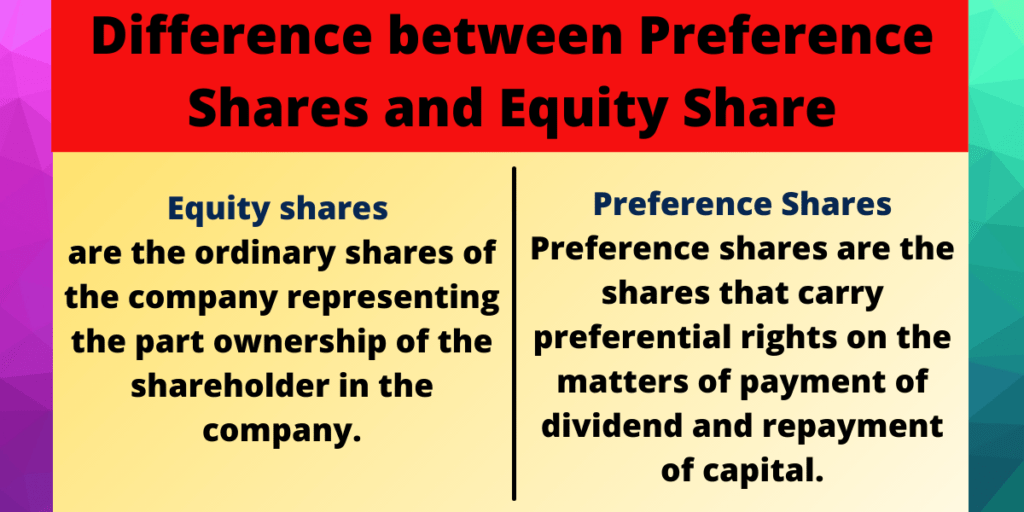Difference Between Preference Shares and Equity Shares (Companies Act 2013)
Table of Contents
Difference Between Preference Shares and Equity Shares
Equity Share
Meaning of Equity Shares:
According to the Indian Companies Act 2013, ” an equity share is a share which is not a preference share”. An equity share does not carry any preferential right. Equity shares are entitled to dividends and repayment of capital after the claims of preference shares are satisfied.
Equity shareholders control the affairs of the company and have the right to all the profits after the
preference dividend has been paid.

Preference Shares
Meaning of Preference Shares:
A share that carries the following two preferential rights is called a ‘Preference Share’:
a) Preference shares have a right to receive dividends at a fixed rate before any dividend is given to equity shares.
b) Preference shares have a right to get their capital returned before the capital of equity shareholders is returned. in case the company is going to wind up.
- Difference Between Fixed Capital and Working Capital
- Difference Between Owned Capital and Borrowed Capital
- Difference Between Debenture and Share
- Difference Between Preference Shares and Equity Shares
Difference between Preference Shares and Equity Shares
| Points | Equity shares | Preference shares |
| 1) Meaning | Shares that are not preference shares are called equity shares i.e. these shares do not have preferential right for payment of dividend and repayment of capital. | Preferences shares are Shares that carry preferential rights as to payment of : a) Dividend and b) Repayment of capital. |
| 2) Rate of Dividend | Equity shares are given dividend at a fluctuating rate depending upon the profits of the company. | Preference shareholders get dividend at a fixed rate. |
| 3) Voting Right | Equity shareholders enjoy normal voting rights. They participate in the management of their company. | Preference shareholders do not enjoy normal voting right. They can vote only on matters affecting their interest. |
| 4) Return of Capital | Equity capital can not be returned during the lifetime of the company. (except in case of buyback) | A company can issue redeemable preference shares, which can be repaid during the lifetime of the company. |
| 5) Nature of capital | Equity capital is known as ‘Risk Capital.’ | Preference capital is ‘Safe Capital’ with the stable return. |
| 6) Nature of investor | The investors who are ready to take risk invest in equity shares. | The investors who are cautious about the safety of their investment, invest in preference shares. |
| 7) Face value | The face value of equity shares is generally Rs 1/- or Rs 10/- it is relatively low. | The face value of preference shares is relatively higher i.e. 100/- and so on. |
| 8) Right and bonus issue | Equity shareholder is entitled to get bonus and right issue. | Preference shareholders are not eligible for bonus and right issue. |


